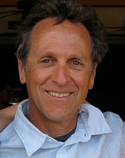
Howard Cohn
The more I rest in present awareness, and don't separate myself out from life, the more I appreciate the impact that I have on others. Only when I am present am I sensitive to my connection to the world, am I able to feel how important it is to be non-harming in my words and actions. When I am lost in thought, I lose that simplicity and sensitivity.
I continually point toward this secret of the present moment, for if I am really present, I don't suffer as much, I don't cause as much suffering, and I am less afraid. I may experience intense pain or pleasure, but the degree of mental suffering lessens. Practicing mindfulness de-conditions the habits that prevent me from being centered in the present. This in turn gives me a more stable awareness, which allows me to recognize my inherent peace and freedom.
It is this taste of nowness--introducing people to the living quality of the present moment and its sense of freedom--that most engages me in my teaching practice. I find no evidence of suffering, in my mind, unless I remind myself of some event that is not in the present. Suffering arises when I am lost in my imagination, reviewing the past or fearfully anticipating the future.
I feel tremendous gratitude and love for the dharma, and the practice of awareness. Knowing my mind a little better, and being less preoccupied with my internal drama, makes me more available to the suffering of others. Consequently, I am moved to give to others rather than focusing on what I can get. In spite of being more attuned to suffering, staying present allows each day to become more joyful, compelling and intereesting. My desire to run from this moment, by running after an imagined, better future, or away from a past fear, has diminished. It is present wakefulness that helps me recover my capacity to live with balance and ease in the world.
510 talks81 retreats4 centers